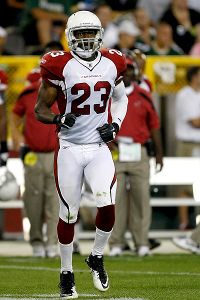So I'm reading through Hamza Abdullah's Twitter rant Thursday and I'm thinking, I've heard this before. The message isn't always profane, of course, and it doesn't often include overt suicidal references. But the unfortunate truth of post-NFL life is that many former players are staggered when they realize the commitment, physical sacrifice and understanding of the team concept during their careers was largely a one-way street.
On this day, Abdullah lashed out at the NFL for its labyrinth system of disability benefits, at an apparent misdiagnosis of an injury and a lack of support after retirement. In since-deleted or edited tweets, he decried the findings of "League of Denial" -- which reported, among other things, that the NFL ignored evidence between concussions and long-term health -- and directly criticized commissioner Roger Goodell for understating the dangers of the game.
(At the moment, Abdullah's Twitter Avatar is the "League of Denial" cover.)

[+] EnlargeAP Photo/Scott BoehmHamza Abdullah is not the first NFL player to lash out at the league regarding his post-career care, and likely won't be the last.The rant brought me back to a discussion two years ago with former Minnesota Vikings defensive end Kenechi Udeze, who did not return to the field after a 2008 leukemia diagnosis. Udeze had been denied disability benefits despite ongoing health problems, and he wanted current and future players to understand what he considered the true nature of the player-league relationship.
Here's part of what Udeze said: "I just think people have to know and realize what's out there. As a player, you're told if you have to retire because of an injury or an illness, there are things the NFL has in place to help you. That's not the case for everyone."
At the time, I sensed limited sympathy for recently retired players such as Udeze and Abdullah. That seems to remain the case, and to be clear, I get why "regular people" don't want to hear complaints about the way a big company treats its employees -- let alone its ex-employees.
Many people feel mistreated, misled and/or lied to by their employers at some point in their life, and usually they didn't get a salary the size of an NFL player's in return. Most jobs don't offer any type of retirement benefits while still of working age, so it might be difficult to identify with Abdullah, who -- at 30 -- is asking for weekly psychiatrist appointments and doesn't want to pay out of pocket for treatment. In the larger context of U.S. employment standards, those expectations might seem naïve.
NFL players aren't more deserving of post-career care, but I do think they leave their jobs in a unique position relative to the rest of the working class. Udeze's point, and the underlying message of Abdullah's rant, was that NFL players are pushed to sacrifice their bodies -- and thus their long-term health -- for the good of their teammates, franchise and league. They routinely push reasonable limits to be accountable and ensure availability. Udeze, for example, began feeling leukemia symptoms during the 2007 season but continued playing. Their assumption, based on oft-repeated messages of "brotherhood" and "fraternity" and "team," is that they will be taken care of if they need post-career help.
One by one, and with varying degrees of shock, retired players realize their expectations don't match reality.
"You hope what happened to me doesn't happen to anyone else," Udeze said in 2011. "But if it does, will they ever be consoled or comforted by anyone in the league office that employed them? I doubt it. The only way they can profit off you is if you're a commodity. You're not a commodity if you're injured or ill."
The point is that these feelings are not unique. Talk to enough retired players and you'll hear variations of the same theme. Former linebacker Scott Fujita, who played his final year in 2012, tweeted: "What if I told you there's nothing overly rare or unique about Hamza Abdullah's feelings? MANY players agree. But he's speaking up. Whether you agree or not is up to you. I'm just saying the sentiment isn't anything out of the ordinary. Lots of angry, quiet voices."
And unless active players are paying attention, the post-career anger will continue.
Reproduced in https://espn.go.com/blog/nflnation/post/_/id/97636/inside-slant-hamza-abdullahs-moment